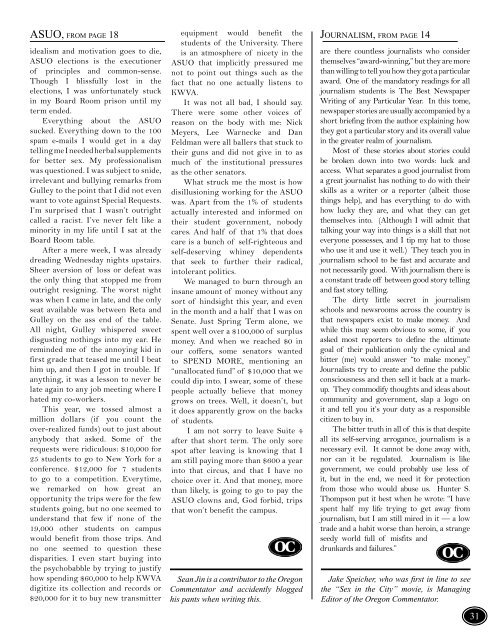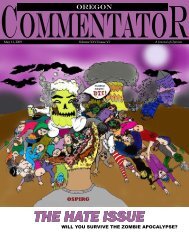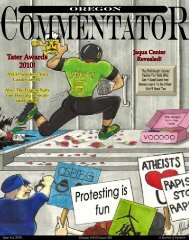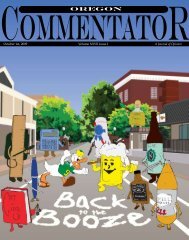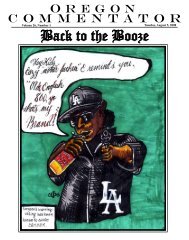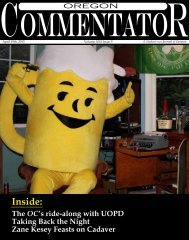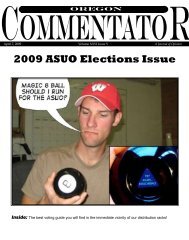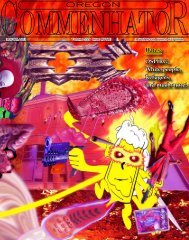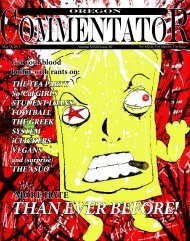HATE - Oregon Commentator
HATE - Oregon Commentator
HATE - Oregon Commentator
Create successful ePaper yourself
Turn your PDF publications into a flip-book with our unique Google optimized e-Paper software.
ASUO, from page 18<br />
idealism and motivation goes to die,<br />
ASUO elections is the executioner<br />
of principles and common-sense.<br />
Though I blissfully lost in the<br />
elections, I was unfortunately stuck<br />
in my Board Room prison until my<br />
term ended.<br />
Everything about the ASUO<br />
sucked. Everything down to the 100<br />
spam e-mails I would get in a day<br />
telling me I needed herbal supplements<br />
for better sex. My professionalism<br />
was questioned. I was subject to snide,<br />
irrelevant and bullying remarks from<br />
Gulley to the point that I did not even<br />
want to vote against Special Requests.<br />
I’m surprised that I wasn’t outright<br />
called a racist. I’ve never felt like a<br />
minority in my life until I sat at the<br />
Board Room table.<br />
After a mere week, I was already<br />
dreading Wednesday nights upstairs.<br />
Sheer aversion of loss or defeat was<br />
the only thing that stopped me from<br />
outright resigning. The worst night<br />
was when I came in late, and the only<br />
seat available was between Reta and<br />
Gulley on the ass end of the table.<br />
All night, Gulley whispered sweet<br />
disgusting nothings into my ear. He<br />
reminded me of the annoying kid in<br />
first grade that teased me until I beat<br />
him up, and then I got in trouble. If<br />
anything, it was a lesson to never be<br />
late again to any job meeting where I<br />
hated my co-workers.<br />
This year, we tossed almost a<br />
million dollars (if you count the<br />
over-realized funds) out to just about<br />
anybody that asked. Some of the<br />
requests were ridiculous: $10,000 for<br />
25 students to go to New York for a<br />
conference. $12,000 for 7 students<br />
to go to a competition. Everytime,<br />
we remarked on how great an<br />
opportunity the trips were for the few<br />
students going, but no one seemed to<br />
understand that few if none of the<br />
19,000 other students on campus<br />
would benefit from those trips. And<br />
no one seemed to question these<br />
disparities. I even start buying into<br />
the psychobabble by trying to justify<br />
how spending $60,000 to help KWVA<br />
digitize its collection and records or<br />
$20,000 for it to buy new transmitter<br />
ocomment@uoregon.edu<br />
equipment would benefit the<br />
students of the University. There<br />
is an atmosphere of nicety in the<br />
ASUO that implicitly pressured me<br />
not to point out things such as the<br />
fact that no one actually listens to<br />
KWVA.<br />
It was not all bad, I should say.<br />
There were some other voices of<br />
reason on the body with me: Nick<br />
Meyers, Lee Warnecke and Dan<br />
Feldman were all ballers that stuck to<br />
their guns and did not give in to as<br />
much of the institutional pressures<br />
as the other senators.<br />
What struck me the most is how<br />
disillusioning working for the ASUO<br />
was. Apart from the 1% of students<br />
actually interested and informed on<br />
their student government, nobody<br />
cares. And half of that 1% that does<br />
care is a bunch of self-righteous and<br />
self-deserving whiney dependents<br />
that seek to further their radical,<br />
intolerant politics.<br />
We managed to burn through an<br />
insane amount of money without any<br />
sort of hindsight this year, and even<br />
in the month and a half that I was on<br />
Senate. Just Spring Term alone, we<br />
spent well over a $100,000 of surplus<br />
money. And when we reached $0 in<br />
our coffers, some senators wanted<br />
to SPEND MORE, mentioning an<br />
“unallocated fund” of $10,000 that we<br />
could dip into. I swear, some of these<br />
people actually believe that money<br />
grows on trees. Well, it doesn’t, but<br />
it does apparently grow on the backs<br />
of students.<br />
I am not sorry to leave Suite 4<br />
after that short term. The only sore<br />
spot after leaving is knowing that I<br />
am still paying more than $600 a year<br />
into that circus, and that I have no<br />
choice over it. And that money, more<br />
than likely, is going to go to pay the<br />
ASUO clowns and, God forbid, trips<br />
that won’t benefit the campus.<br />
Sean Jin is a contributor to the <strong>Oregon</strong><br />
<strong>Commentator</strong> and accidently blogged<br />
his pants when writing this.<br />
Journalism, from page 14<br />
are there countless journalists who consider<br />
themselves “award-winning,” but they are more<br />
than willing to tell you how they got a particular<br />
award. One of the mandatory readings for all<br />
journalism students is The Best Newspaper<br />
Writing of any Particular Year. In this tome,<br />
newspaper stories are usually accompanied by a<br />
short briefing from the author explaining how<br />
they got a particular story and its overall value<br />
in the greater realm of journalism.<br />
Most of these stories about stories could<br />
be broken down into two words: luck and<br />
access. What separates a good journalist from<br />
a great journalist has nothing to do with their<br />
skills as a writer or a reporter (albeit those<br />
things help), and has everything to do with<br />
how lucky they are, and what they can get<br />
themselves into. (Although I will admit that<br />
talking your way into things is a skill that not<br />
everyone possesses, and I tip my hat to those<br />
who use it and use it well.) They teach you in<br />
journalism school to be fast and accurate and<br />
not necessarily good. With journalism there is<br />
a constant trade off between good story telling<br />
and fast story telling.<br />
The dirty little secret in journalism<br />
schools and newsrooms across the country is<br />
that newspapers exist to make money. And<br />
while this may seem obvious to some, if you<br />
asked most reporters to define the ultimate<br />
goal of their publication only the cynical and<br />
bitter (me) would answer “to make money.”<br />
Journalists try to create and define the public<br />
consciousness and then sell it back at a markup.<br />
They commodify thoughts and ideas about<br />
community and government, slap a logo on<br />
it and tell you it’s your duty as a responsible<br />
citizen to buy in.<br />
The bitter truth in all of this is that despite<br />
all its self-serving arrogance, journalism is a<br />
necessary evil. It cannot be done away with,<br />
nor can it be regulated. Journalism is like<br />
government, we could probably use less of<br />
it, but in the end, we need it for protection<br />
from those who would abuse us. Hunter S.<br />
Thompson put it best when he wrote: “I have<br />
spent half my life trying to get away from<br />
journalism, but I am still mired in it — a low<br />
trade and a habit worse than heroin, a strange<br />
seedy world full of misfits and<br />
drunkards and failures.”<br />
Jake Speicher, who was first in line to see<br />
the “Sex in the City” movie, is Managing<br />
Editor of the <strong>Oregon</strong> <strong>Commentator</strong>.<br />
31


